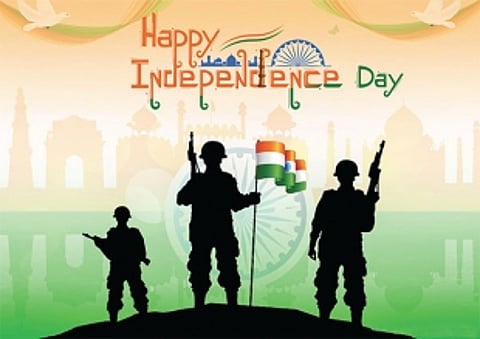

When the clock struck midnight on August 15, 1947, the
tricolour flag soared high, heralding a new era of political autonomy. India’s
people embraced the power to shape their destiny, elect their leaders, and
forge a democratic nation. The struggle for political freedom echoed the global
aspiration for self-determination, inspiring other nations to seek liberation
from oppressive regimes.
On this day, India celebrates the pivotal moment in history
when we broke free from the chains of colonial rule. This day embodies the
possibilities of what freedom can and should be. The idea of ‘freedom’ is one
that resonates with the struggles and aspirations of people worldwide and can
mean vastly different things to different people.
For Reeve Fernandes, 21-year-old from Vasco, it is fairly
simple, “Freedom to me is the right to speak about anything and have opinions
regarding anything without any restrictions,” he says. In contemporary India,
intellectual freedom continues to shape narratives, catalyzing debates on
social justice, identity, and progress. Bloggers, writers, and activists engage
in conversations that challenge the status quo, inspiring collective
introspection and societal evolution.
“In the heart of India, freedom resonates like an ancient
melody, echoing stories of struggle and triumph,” says Alleena Anna Mathew from
Sodiem - Siolim. “It’s the essence of breathing without constraints, a legacy
passed down through generations.”
Independence Day underscores the significance of personal
freedom in shaping individual destinies. It celebrates India’s rich diversity
and the myriad ways in which citizens express their identities. The
Constitution of India guarantees fundamental rights, ensuring that every
citizen can live authentically and without fear of discrimination.
Manshi Nagar, from Dabolim says, “Freedom, in my perspective,
encompasses an expansive horizon of boundless opportunities that anyone can
navigate with unwavering courage; a realm where the notion of failure is not
only tolerated but embraced.” However, this doesn’t mean that there are no
restrictions, “To this I add only one reasonable limit -- one person’s liberty
should never stifle the freedom on another individual. When we will be able to
achieve this, we shall be truly free,” she says.
A right often infringed upon is the women’s right to safety.
Freedom and women’s safety in India share an intricate relationship,
representing both the progress made and the challenges that persist.
“To me, freedom is the ability to choose my own paths
without facing discrimination in any form,” says Chiquita Fernandes, a 23-year-old
from Margao. “It means something as simple as being able to go for a walk
without being harassed, a freedom which most women are yet to achieve,” she
adds.
While India celebrates its hard-fought political freedom,
ensuring the safety and empowerment of its women remains a critical frontier.
Women’s safety is a fundamental aspect of freedom, allowing them to fully
participate in all spheres of life without fear.
The struggle against gender-based violence, harassment, and
discrimination is ongoing. “True freedom for Indian women entails a society
where they can exercise their rights without compromise, move through public
spaces without apprehension, and thrive as equals in every endeavour,” says
Patricia Pereira, a law student from Vasco. It demands collective efforts to
create a secure and inclusive environment, where women can experience the full
spectrum of freedom in their personal and public lives.
Aishwarya Harish, a 46-year-old says, “Freedom to me is the
right to act, speak, dress the way I like and to choose what I feel is right,
where I set my boundaries. A place where there is no fear.” This seems to be a
general consensus among women -- the need for freedom to just be themselves. “I
am grateful for the freedom I enjoy. But at the same time I also feel for the
millions of Indians who are on the other side still fighting for it,” adds
Aishwarya. “I will forever be indebted to the numerous men and women who fought
for it and got it for us -- the lucky ones.”
“For a girl, freedom is the radiant dawn after a long night,
where barriers dissolve, and she blossoms into her full potential,” Alleena
says. “Just as the nation strides forward, life and womanhood converge,
illuminating the path to self-discovery and empowerment, making every pursuit and
aspiration attainable,” she adds.
Independence Day embodies the collective legacy of freedom
that resonates across cultures, borders, and generations. It encapsulates the
human pursuit of autonomy, expression, and well-being. As the nation unfurls
the tricolour and participates in celebrations, it commemorates not only the
historical achievement of political independence but also the ongoing journey
to realize the profound dimensions of freedom.
Just as India’s struggles inspired global movements, the nation’s
progress serves as a beacon of hope for those yearning to break free from
oppression, inequality, and injustice. This day is a reminder that the quest
for freedom is universal and unites humanity in a shared aspiration for a world
where every individual can thrive in dignity and liberty.
Indrani Char, an engineering student says that freedom means
everything to her, “When Nehru said in his speech that long years ago we made a
tryst with destiny, I understand the significance it carried for each individual
in this nation, the long awaited claim to individuality, and that our fight was
over finally and we had won.” She adds, “In the 21st century, we struggle with
a new context of freedom -- to strive to be a better world, not just for us,
but for the freedom of generations to come.” In her opinion, they should have
the freedom to be global citizens, “So that when someone asks them what freedom
means maybe they have a better answer than mine. It’s all I hope for.”